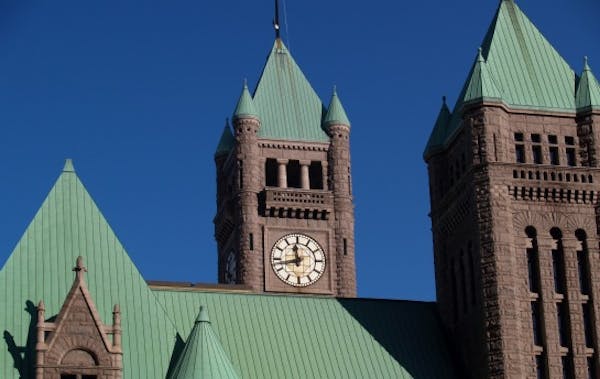Workers' groups hoping to make Minneapolis' minimum wage one of the highest in the country hit a major obstacle Thursday as the city's lawyer said the advocates' ballot petition does not meet legal requirements.
In a 16-page written opinion, City Attorney Susan Segal said the petition to let voters decide if the city should amend its charter to set a $15-an-hour minimum wage does not fit into the narrow window of city government issues that can be altered by a popular vote. Minneapolis' charter does not allow for direct citizen input to pass city ordinances. Residents can vote only on proposals to amend the charter, a document that outlines the general functions of municipal government.
Calling the proposal "an ordinance disguised as a charter amendment," Segal noted that it "does not in any way relate to the form, structure or distribution of powers within the municipal enterprise." She cited a 2005 case that involved a petition to amend Minneapolis' charter to allow the use of medical marijuana, where the court upheld the council's decision to block the matter from the ballot on legal grounds.
The opinion on minimum wage urges the City Council to not forward the issue for placement on the ballot. The council — which will only consider the legal status of the charter amendment proposal, not the wage issue — will discuss it in an Aug. 3 committee meeting and take a final vote Aug. 5. In the meantime, both supporters and opponents of the idea are mobilizing in an attempt to sway council members — and prepare for lawsuits if the decision doesn't go their way.
Joining a trend
Supporters of the wage increase, who turned in more than 8,400 signatures from registered voters to get the issue considered, have said that they are prepared to take legal action if the council fails to put the proposal on the ballot. Organizers of the effort include the groups 15 Now, Centro de Trabajadores Unidos en Lucha and Neighborhoods Organizing for Change.
After Segal posted her opinion, advocates released a response from attorney Laura Huizar of the National Employment Law Project, who called Segal's response "deeply regrettable" and "misguided." She said the city can only prevent a charter amendment proposal from going to voters if it is unconstitutional or conflicts with state law, and argued that the proposal doesn't have either of those problems.
"Like the 42 percent of Americans nationwide who earn below $15 per hour, workers in Minneapolis need a higher minimum wage to make ends meet," she said.
Advocates want Minneapolis to be part of a growing trend of cities tackling wage increases. A handful of other cities, including Seattle, Los Angeles and San Francisco, have passed ordinances that will raise the minimum wage to $15 over the next few years, while others have approved smaller increases. On Thursday, a committee of the Baltimore City Council unanimously approved a $15 minimum wage proposal, which will now be considered by that city's full council.
In her opinion, Segal noted that no other city that has adopted a $15 wage has done so through a charter amendment.
The Minneapolis proposal would gradually raise wages to $15 over several years, hitting that amount in 2020 for businesses with more than 500 employees and in 2022 for smaller businesses. On Aug. 1., Minnesota's minimum wage, which is higher than the federal standard, is set to rise to $9.50 per hour for large employers and $7.75 for smaller employers.
Economic concerns
Business groups, meanwhile, have expressed concerns over both the method for passing a wage increase and the potential economic impacts of the increase. Some have noted that a wage hike would come on the heels of a new requirement that nearly all businesses with workers in Minneapolis provide paid sick leave.
John Stanoch, interim president and CEO of the Minneapolis Regional Chamber of Commerce has said his group would be ready to consider legal action should the charter amendment proceed to a vote. In a statement issued shortly after the release of Segal's opinion, Stanoch and Minneapolis Downtown Council president and CEO Steve Cramer said they agreed with the analysis and urged the council and Minneapolis Mayor Betsy Hodges to "follow the sound legal advice of their city attorney."
"The opinion also avoids the dangerous precedent of allowing the city charter to be misused now and in the future," they said.
Hodges said she continues to disagree with a citywide wage increase, instead favoring wage hikes at the federal, state or regional level.
Hodges said she's waiting to see the results of a study commissioned by the city to examine the likely economic impact of a wage increase. That report is due in September.
Another opinion
Also on Thursday, Segal released a separate opinion on a charter amendment proposal that also received enough signatures to merit consideration.
That plan, from a group called the Committee for Professional Policing, proposes a new requirement that all Minneapolis police officers would have to carry professional liability insurance. Supporters said such a move would reduce officer misconduct because individual police officers would be responsible for higher premiums prompted by misconduct lawsuits.
In her written opinion, the city attorney said the proposal conflicts with state law covering the defense and indemnity of public employees and employment terms requiring "good-faith" negotiations under the Minnesota Public Employment Labor Relations Act.
Erin Golden • 612-673-4790
Body camera video shows Minnetonka man shooting at deputies several times before dying in firefight
Charge: Driver going 77 mph ran red light, fatally hit man crossing St. Paul street and kept going
Minnesota Senate GOP files ethics complaint against Sen. Nicole Mitchell
High school archer focuses on target: another national championship

